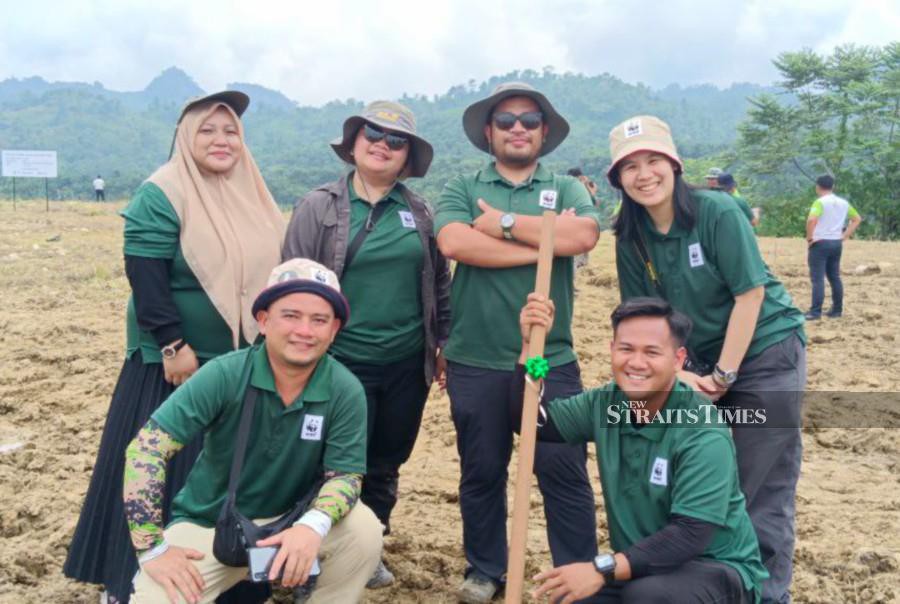By Olivia Miwil - September 26, 2023 @ 6:51pm
LAHAD DATU: Setting aside 7.1 hectares of plantation land for conservation purposes is considered a significant achievement.
WWF-Malaysia Sabah Landscapes Programme Restore Lead Dr. Faisal Mohd Noor acknowledged that while the allocated land may seem small compared to the nearby Bagahak Ecological Corridor Restoration Project covering 57 hectares, it plays a crucial role.
"But that 7.1 hectares of land is essential for reconnecting patches of the Silabukan Forest Reserve and Tabin Wildlife Reserve to create a corridor for species like orangutans to move around.
"Based on WWF consensus, there are approximately 15 orangutans at Silabukan Kecil, 50 at Silabukan Forest Reserve, and about 1,200 at Tabin Wildlife Reserve.
LAHAD DATU: Setting aside 7.1 hectares of plantation land for conservation purposes is considered a significant achievement.
WWF-Malaysia Sabah Landscapes Programme Restore Lead Dr. Faisal Mohd Noor acknowledged that while the allocated land may seem small compared to the nearby Bagahak Ecological Corridor Restoration Project covering 57 hectares, it plays a crucial role.
"But that 7.1 hectares of land is essential for reconnecting patches of the Silabukan Forest Reserve and Tabin Wildlife Reserve to create a corridor for species like orangutans to move around.
"Based on WWF consensus, there are approximately 15 orangutans at Silabukan Kecil, 50 at Silabukan Forest Reserve, and about 1,200 at Tabin Wildlife Reserve.
He was speaking to the media after a tree-planting ceremony at Ladang Bukit Tabin here.
Present were WWF-Malaysia Sabah conservation head Dr Robecca Jumin, Sabah Forestry department deputy chief conservator of forests Dr Robert Ong, KLK Sabah senior general manager Dinakaran Madhavan.
The ceremony marked the commencement of a 5-year collaboration between WWF-Malaysia and Kuala Lumpur Kepong Sdn Bhd (KLK) for the Bukit Tabin Wildlife Corridor Restoration project.
During the first two years, WWF-Malaysia will facilitate the planting of fast-growing trees, while KLK will maintain the area in the subsequent years.
The project is also funded by German multinational company Beiersdorf AG that focuses on restoration activities under the WWF-Malaysia Sabah Landscapes Programme to enhance connectivity and improve wildlife corridor establishment in Sabah.
Faisal said that the latest partnership in conservation reflects the success of WWF-Malaysia's Landscape Programme, as it demonstrates that companies like KLK are going beyond their usual routines and becoming more responsible land users.
KLK Sabah Lahad Datu region general manager Saparuddin Rabayani said that the 7.1 hectares of productive land could have been used to plant approximately 1,050 oil palm trees.
"This project aligns with KLK's biodiversity conservation policy to protect rare and endangered species, particularly orangutans, elephants, sun bears, gibbons, and others, allowing them to move freely and safely.
"It will also reduce human-wildlife conflicts, as the pathway will deter encroachment.
"The restoration project will benefit the company by improving its corporate image, attracting investors, and drawing new talent."
Since 2021, KLK has collaborated with Bringing Back Our Rare Animals (BORA) to restore grazing pastures and riparian zones within Tabin Wildlife Reserve for Tembadau and has planted 1,600 Ficus trees and 23,000 Napier grass.
KLK has also been involved in a 33-hectare jungle rehabilitation project at the Malambabula Wildlife Habitat Improvement Area, situated between KLK Ladang Rimmer and Ladang Tungku.

Comments
Post a Comment